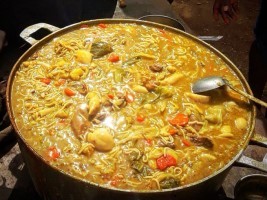|
||||||||||||||||||
| Download the revised decree and electoral calendar, published in the official journal |
|
|
Haiti - Culture : The «Soup joumou» on the list of Intangible Cultural Heritage of Humanity 17/12/2021 08:36:28
Thursday, December 16, 2021, UNESCO at its 16th intergovernmental session adopted the inscription of the traditional Haitian "Soup joumou" on the list of Intangible Cultural Heritage of Humanity. After the adoption of the "Soup joumou", UNESCO ambassadors visited the Haitian representative office to taste the fabulous giraumon soup. Azoulay, Director General of UNESCO : "It is an inscription of which we are very proud because it marks the recognition of the international community with regard to the Haitian heritage, so much the 'Soup Joumou' is linked to the history of the country and to the heroes and heroines of the independence." Ambassador of Haiti to UNESCO : "This historic moment was made possible thanks to the collaboration of a large number of actors : the Haitian National Commission for Cooperation with UNESCO, the Haitian Government. Thanks also to the students, professors and researchers of the State University of Haiti who carried out an inventory of this element; associations and community groups that supported the candidacy; to the photographers and videographers who contributed to it; to the experts who provided the writing and translation; national and international media. Long live the 'Soup Joumou' !" Dominique Dupuy, Permanent Delegate Ambassador of Haiti to UNESCO. Ambassador of Switzerland Muriel Berset Kohen : "If today we accept the application of giraumon soup on the list, it is not out of generosity due to the exceptional circumstances that Haiti is going through, but it is because of the quality of the dossier. The criteria were met and this, it must be emphasized [...]" Ministry of Culture : "Joumou soup is officially listed on the Representative List of the Intangible Heritage of Unesco. Bravo 'Soup Joumou', bravo libète, bravo Haiti" Ministry of Culture. Claude Joseph : "[...] I welcome this news with great pride and emotion. 'Soup joumou raple nou sakrifis zansèt nou yo te fè pou te goumen kont esklavaj ak rasis sou latè. Ayibobo pou zansèt nou yo. Ayiti pap peri' !!' Claude Joseph, Former Prime Minister, Former Minister of Foreign Affairs. Find out more about the Giraumon soup : Joumou or giraumon soup is a traditional Haitian pumpkin soup made with vegetables, plantains, meat, pasta and spices. It is a celebratory dish, deeply rooted in Haitian identity, and its preparation promotes social cohesion and belonging among communities. Originally reserved for slave owners, Haitians took ownership of the soup when they gained independence from France, turning it into a symbol of their newly acquired freedom and an expression of their dignity and resilience. It is made from giraumon, a variety of pumpkin once cultivated by the indigenous peoples of the Caribbean, and is prepared and consumed specifically on the first of January – Haiti’s Independence Day – when it constitutes the first meal of the year. It also serves as traditional Sunday breakfast. The preparation of Joumou soup is a family and community affair: women manage the overall activities, children help to prepare the ingredients, artisans make the aluminium pots and other utensils used to prepare the soup, and farmers work the land to harvest the vegetables. Today, several variations of the soup can be found in Caribbean and Latin American cuisines. S/ HaitiLibre
|
|
|
Why HaitiLibre ? |
Contact us |
Français
Copyright © 2010 - 2026 Haitilibre.com |





